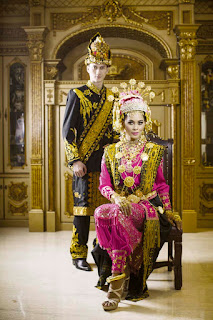Do You Know Peusijuek?
Do You Know Peusijuek?
Hallo everyone, today I wanna tell you something new about customs tradition from Aceh. That is "The Peusijuek".
Let's read..
Peusijeuk
Peusijuek (= cold) is derived from the word "sijue" (aceh language) which means cold. Cold or cool, in certain countries in the tropics also means: happiness, serenity, peacefulness (Aceh language: seu'uem) is similar to disaster. If a person has "hot" influences or is in such a state, the person will seek refrigerant to remove or reject the effects of the heat. At every age, man is inseparable from that influence; Therefore peusijue "is done at all ages. As a cooling medicine including rice (Acehnese: breueh) and rice (Acehnese language: padè), 2 raw eggs and a bowl of water sprinkled with little rice flour (Acehnese: teupông taweue). In the water is also included plants that are cold, namely: "ôn sisijue", "ôn manè manoe" and "naleueng sambô", sometimes also included "ôn" (English: leaves) when and ôn pineueng mirah. The plants were tied into a small file and with it sprinkled the person who wanted to be cooled or the object. Then the person is edited (Acehnese language: peusunténg) the yellow sticky rice behind the earlobe (Van Waardenburg, 1936: 3).
In addition, usually peusijuek event (siege tawari) done by the people of Aceh as a form of gratitude for the safety and success of achieving something, both related to objects and people (Sufi, 2002: 18). According to Husin (1970) all pesijuek is addressed as a statement of gratitude to Allah SWT, for the blessings that he gave, as well as pleas and hope to gain blessings and salvation of life. In addition, peusijuek is also a customary symbol to apologize to others for a mistake and an oversight (Kurdi, 2005: 158). Some peusijuek are still implemented by the community, namely:
A. Peusijuek Meulangga
In the event of a dispute between the population, for example between A and B or between the population of gampong A with the residents of gampong B and this dispute resulted in blood, after peace was also carried out peusijuek. Peusijuek is often called peusijuek meulangga. At the ceremony it is also often given money, called the number of sayam according to the agreement. If the dispute occurs as mentioned above, but it does not bleed, for example fights, peace and peusijuek ceremonies are done but not given money.
B. Peusijuek Pade Bijeh
The event of peusijuk pade bijeh is done by farmers against rice to be used as seed (seed) before seeding in the fields. The purpose of this peusijuk contains hope that the seeds to be planted get Allah's grace, fertile and fruitful.
C. Peusijuek Tempat Tinggay
Everyone who inhabits a new house, the habit is done peusijuek event. Its implementation by some people consists of three, five people and so on in odd numbers. This ceremony is meant to take the blessing that those who live in this place get the pleasure of Allah easy reziki and always in good health wal'afiat.
D. Peusijuek Peudong Rumoh
Home is one of the basic human needs. Therefore, house building activities are always chosen on a good day. Similarly, in choosing materials that are considered good home. Furthermore, building a house or often called peudong rumoh begins with a ceremony peusijuek. Dipeusijuek which usually is the pole (tameh) king, and tameh Putroe and builders who do (utoh) that he is blessed by Allah SWT.
E. Peusijuek Keurubeuen
For Muslims who are able to often give sacrifices on holidays in accordance with religious law. A small animal (goat or sheep) is enough for a victim for a person, while seven people together give a big animal (cow).
F. Peusijuek Vehicles
If a new person has a vehicle or other transportation, then held peusijuek. It is intended that the vehicles used will be spared from accidents. One person or even three people.
G. Peusijuek Up the Hajj, Sunnah Apostle Marriage
In the stage of life is usually also held peusijuek, such as sunnah rasul (circumcision), marriage, and so forth. This activity is still being implemented in Aceh which is intended to get a blessing for the bride or circumcised child.
The meaning of the implementation of peusijuek is
- Talam, means that people in "peusijuek" remain united in the abandoned family environment.
- Clok (calok), implies that the person in "peusijuek" is still in a family environment in the family (unity) and frugality.
- The hood (sangee), containing the meaning is expected to obtain protection from Allah SWT, from all the deceptive deceptions.
- Rice, meaning that people in "peusijuek" getting older is more knowledgeable, it is also a staple meal or seed to produce.
- Freshwater flour, meaning that white flour is a symbol of cleanliness and coolness of the soul for people in "peusijuek".
- On manek-mano, meaning that in accordance with the row of flowers is expected in unity and unity and order unity.
- On sijuek, containing the meaning of the antidote or the coolness pervasive the heart.
- Naleung Samboe, contains meaning with its solid nature is difficult to be revoked, the miner as a solidity of establishment and ethics, both in social life and religion.
- Bu leukat, containing the meaning of the adhesive substance, the miner as an attraction to remain pervasive in the hearts of the people in "peusijuek" all teachings and advice to the path that is blessed by Allah SWT.
Ok, maybe just it.
Thank you for reading...




Komentar
Posting Komentar